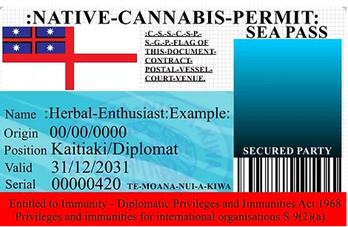

IR-01-24-35441
26 November 2024
D Clampett Trust
[FYI request #28656 email]
Tēnā koe D Clampett Trust
Request for information
Thank you for your Official Information Act 1982 (OIA) request of 4 October 2024. You asked
for information regarding training, operations, legislation, and policy information.
I note that your request refers to “operations about how to deal with…” The wording implies you
consider operations to be a form of training activity, which is not how Police would typically
employ that word. The response therefore focuses on the training component of your request.
A response to each part of your request can be found below.
1.
Any training or operations by New Zealand Police on how to deal with Sovereign Citizens?
2.
Any training or operations about how to deal with members of the public who use common
law or natural law?
Sovereign Citizens’ are widely understood to be members of an international movement that
questions the legitimacy of existing legal systems and share a distrust of modern governments.
Police does not receive formal training on how to engage with sovereign citizens, however
general guidance is available through Police’s internal staff intranet to increase knowledge and
awareness of the sovereign citizen movement.
Please refer to Appendix One for guidance material. Some information has been withheld under
section 6(c) of the OIA, as release of this information would likely prejudice the maintenance of
the law.
Police recognises the common law which has been developed through judicial decisions.
Common or natural law as generally used/cited by sovereign citizens is not recognised by
Police and is not the subject of training at RNZPC therefore your request is refused under
section 18(e) of the OIA, as the information requested does not exist.
3.
Any training or operations about how to deal with members of the public under the
Counter-Terrorism Legislation Act 2021 legislation?
Police does not have specific training created fol owing the enactment of Counter-Terrorism
Legislation Act 2021. This Act made significant changes to the Terrorism Suppression Act 2002
and the Search and Surveil ance Act 2012. This part of your request is therefore refused under
section 18(e) of the OIA, as the information requested does not exist.



However, Police has a 30-minute e-Learning module available cal ed “Terrorism and Violent
Extremism – Prevention First”. This module increases general awareness around terrorism and
violent extremism. Staff learn about the definitions, risk and behaviours for radicalisation,
terrorism, and violent extremism, how to report, where to go for help and what advice to give to
keep our communities safe.
Police is informed by Terrorism Suppression Act 2002 and related legislation, standard
prevention, investigation, and prosecution policies and the Te Tiriti o Waitangi in all decision
making when preventing, responding to, and investigating terrorism and violent extremism.
4.
If any of those trainings are Police policy, how many are being currently rol ed out currently
or in the past?
5.
If any of those trainings or operations are being run, where are these being run and by
whom?
6.
Are any of these trainings or operations a standard of the police college training?
7.
Have NZ Police adopted policies related to al of the above?
As per the answers to your questions 1, 2 and 3, Police does not have specific trainings, nor a
specific policy on sovereign citizens therefore your request is refused under section 18(e) of the
OIA, as the information requested does not exist.
However, Police does have a policy on Counter Terrorism – investigation and prevention. Staff
complete the compulsory e-Learning module Terrorism and Violent Extremism – Prevention
First at the commencement of their employment. The e-Learning module was launched on 19
April 2018.
8.
If this training is implemented in policy, who signed this off?
This policy on Counter Terrorism – investigation and prevention is authorised by the Strategic
Tasking and Coordination Governance Group.
Please note that as part of its commitment to openness and transparency, Police proactively
releases some information and documents that may be of interest to the public. An anonymised
version of this response may be publicly released on the New Zealand Police website.
You have the right to seek an investigation and review by the Ombudsman of this decision.
Information about how to make a complaint is available at
www.ombudsman.parliament.nz or
freephone 0800 802 602.
Nāku noa, nā
Inspector Bernadette Boyle-Tiatia
Director - Training
New Zealand Police
Sovereign Citizens
‘Sovereign Citizens’ (SOVCIT) are members of an international movement that
questions the legitimacy of modern governments. SOVCITs try to opt of any
obligations to government by claiming that everyday people are ‘born free’ with
natural or ‘common law’ rights, but give up these rights by entering into contracts
with governments. ‘Contracts’ can include what most citizens consider ordinary
items such as driver’s licences, but can extend to ignoring rules and laws with which
they disagree.
Other SOVCIT adhere to conspiracy theories that recent laws are not valid and will weave
elaborate webs of argument about real and fake laws to justify their position.
SOVCIT ideology is not inherently violent, but some SOVCIT will hold other extremist views. In a
worst-case scenario SOVCIT could become violent towards NZ Police or other authorities and
could be referred to the National Security Persons of Interest (NATSEC POI) team.
Beliefs
SOVCITs tend to adopt a range of complex and overlapping narratives, not all of which are
rational. What most SOVCITs have in common is a belief that government and bureaucratic
structures are ‘corporations’. From this viewpoint ‘corporations’ are imposter business entities
that impose on everyday people, and SOVCITs will create elaborate justifications to avoid
participation in them. SOVCITs can often be identified by use of key language and references
such as:
“I am a real person” or “I am a living person/being”
“I am a freeman of the land”
“I do not consent to contract”
“Admiralty Law”
“Magna Carta” and “Suri Juis”
“Postmaster General”
SOVCIT documentation is often a blur of “legalese”, language and illogical claims to bogus
legal status based in SOVCIT narratives.
Organisation
The SOVCIT movement has been active in New Zealand for two decades or more, but has
existed in various forms in the US since at least the 1970s.
SOVCITs don’t usually form permanent groups or organisations, but can group together around
specific interests, concerns, and/or perceived threats. In the worst cases government officials
or others can experience ongoing harassment and bullying from SOVCITs via what has been
described as “paper terrorism” (where a SOVCIT or group of SOVCITs bombard a target with
fake legal or similar documentation). In the worst cases this can severely impact the ability of
the official to perform their role or can badly affect the personal life of others.
Adoption of SOVCIT narratives are especially popular among individuals and groups who
already feel isolated or oppressed by the government or the actions of its agents (in New
Zealand this is especially the case in regard to courts, Police, or the taxation system). In the
worst cases vulnerable people, especially the mentally unwell, can adopt or select ideological
snippets from the movement to justify a very wide range of irrational and at times criminal
behaviour.
National Security Threats?
Because SOVCITs commonly deploy fake information to confuse and misinform, and can use
opposition to ‘corporations’ to justify extreme behaviour, adherents frequently present a
danger to themselves or others. Note that while information might be fake, the SOVCIT might
genuinely believe it to be true.
Not all SOVCITs are a threat to national security, themselves, or others. Some however will hold
attitudes or beliefs that require the individual to be referred to the NATSEC POI team. If you
believe this to be the case, please contact
NATSEC POI via email at [email address]
In the US, the Federal Bureau of Investigation classifies "sovereign citizen extremists" as
domestic terrorists (for example, Terry Nichols, one of the perpetrators of the 1995 Oklahoma
City bombing, subscribed to a variation of sovereign citizen ideology). In surveys conducted in
2014 and 2015, representatives of US law enforcement ranked the risk of terrorism from the
sovereign citizen movement higher than the risk from any other group, including Islamic
extremists, militias, racists, and neo-Nazis. The New South Wales Police Force in Australia has
also identified sovereign citizens as a potential terrorist threat.
To date no NZ-based SOVCITs have presented as significant a risk as is occurring in the US.
Available Products
SITG have a range of products available if you're wanting or needing to know more about
SOVCITS. If you're interested, please contact the team via
[email address]
NIC – IN – Extremist Profile for Sovereign Citizens in New Zealand
NIC – IN – 240411 – Home Guard Global
NIC – IN – 230530 Update – Sovereign Citizens in New Zealand
NIC-KP-220505 Sovereign Citizen activity followup
NIC-IN-220225-Maori and Sovereign Citizens
NIC-IN-220413 Emerging Sovereign Citizen Events
NIC-IN-210618 Recent Allodial Law Claims REDACTED
Products that relate to
likely inactive Sovereign Citizen groups:
NIC-IN-202009010 Sovereign Citizens - the Māori Ranger Security Division
NIC-IN-201224 The Mauri Nation
Alerts for Sovereign Citizens
The Security Intelligence and Threats groups has established a NIA alert to help warn staff
when they’re likely to be dealing with a SOVCIT. Further details on what to look for and the
process can be found here.
link to page 6

 Security Intelligence and Threats Group
Security Intelligence and Threats Group
The Sovereign Citizen (SOVCIT)
movement is gaining traction in New
Zealand. It’s been around for a long
time, but recently we’re seeing growing
numbers of New Zealanders who claim
fake “common law” rights to avoid
government authority and everyday
legal obligations.
Security Intelligence and Threats Group
(SITG) have established a NIA alert to
help warn staff when they’re likely to be
dealing with a SOVCIT. This alert warns a NIA user that a person has been identified as a
SOVCIT, and links back to
this page.
A big part of SOVCIT behaviour can be described as ‘harmless but annoying’, and there is
the possibility that you’ve encountered them without realising. These are the drivers who
present a bogus “sea pass”, or “travel pass” (example above) instead of a driver’s licence,
or others who mail pretend legal documentation to government agencies, city councils, or
Stations and insist that it is genuine.
If you think you’ve been dealing with a SOVCIT, add relevant details to a NIA record and
l
et SITG know. We’ll assess your information, and where appropriate add an alert that will
hopefully make things easier for the next staff member who deals with the person.
The sort of information we’d need in the NIA record is simple: indications that the person
is providing documents containing SOVCIT ‘legalese’, refusal to comply with lawful orders
and instead producing bogus documentation, or making specific claims about being a
‘freeman of the land/’Living being/man/woman’ or similar.
Some key notes:
Only some SOVCIT are violent, most are simply
annoying
There is no legal basis whatsoever for the vast
majority of SOVCIT claims such “diplomatic
immunity”
While SOVCIT documentation presents as gibberish,
Te Kara o Te Whakaminenga o Nga
it has its own internal logic, and they often include
Hapu o Nu Tireni, often called He
key details such as their real name and date of
Whakaputanga
birth, so are worth scanning.
Te Kara o Te Whakaminenga o Nga Hapu o Nu Tireni, the 1835 flag, is extremely
popular with SOVCITs, but there is no real link between the SOVCITs and the Māori
Sovereignty/Tino Rangatiratanga movement.
Last modified: 11/07/2024






